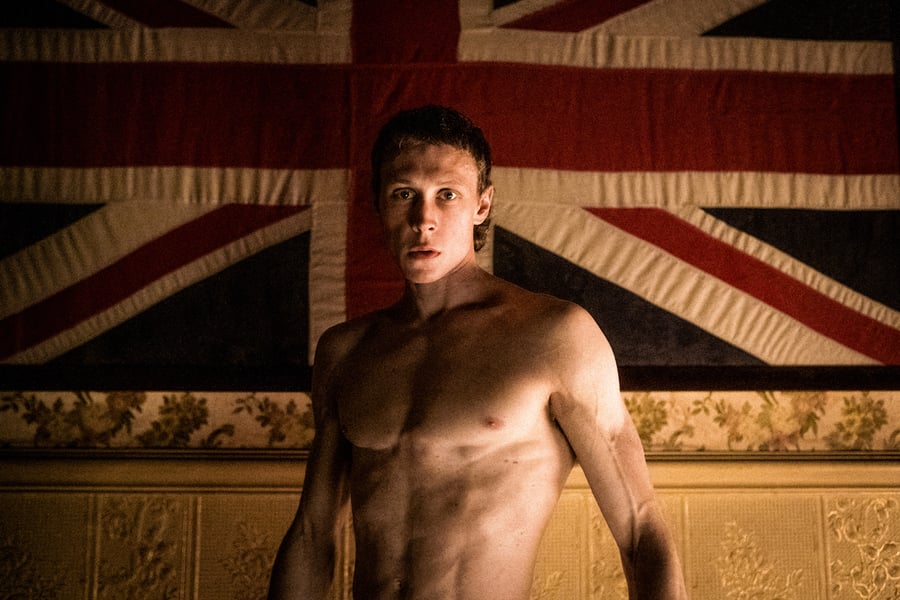“Nothing You Are About to See Is True.”
Those are the words that teasingly introduce True History of the Kelly Gang, the dazzling and defiantly rogue western from director Justin Kurzel that plays with facts to get at a deeper truth about Ned Kelly. This we know is true about 19th-century outlaw: The Irish-Catholic bank robber and cop killer who wore a metal helmet and a suit of armor in his final shootout with the law became known as Australia’s Robin Hood as he and his gang fought against British colonial rule in the name of the rural poor. The legend of of this criminal, who died by hanging in 1880 at age 25, has been burnished ever since, in everything from songs and stories to tattoos and postage stamps. Ned was the subject of paintings by Sidney Nolan, ballads by Johnny Cash and Waylon Jennings, and screen bios in 1970 (starring Mick Jagger) and 2003 (starring Heath Ledger). His image was even used during the opening ceremony of the 2000 Summer Olympics in Sydney. He was — and is — the equivalent of rock star down under.
The details of Kelly’s life are sometimes borrowed, but more often messed with by Kurzel, the violence-obsessed Aussie director of The Snowtown Murders and a recent adaptation of Macbeth (starring Michael Fassbender). Based on Peter Carey’s freewheeling 2001 novel of the same name, with a script by Kurzel regular Shaun Grant, the movie is less a biopic than a surrealist attempt to show Ned, played with blazing intensity by 1917‘s George MacKay, as the product of his own time and deranged imagination. Narrated in voiceover as a letter from the robber to his infant daughter (he never had a child, but go with it), the film uses expressionistic flourishes to find a bruised, punk-rock style of poetry.
True History opens with a startling aerial shot, gorgeously filmed by cinematographer Ari Wegner: A man on horseback is wearing a flowing, red gown and galloping across a wasted outback. Ritual cross-dressing was just one method, it seems, that these Kellys use to freak out their enemies. The man is Ned’s father, John “Red” Kelly (Ben Corbett), a better drunk than a thief since he forces his wife Ellen, sensationally acted by Babadook star and the director’s wife Essie Davis, to turn tricks with, among others, Brit Sergeant O’Neill (Charlie Hunnam). The young Ned (Orlando Schwerdt) is disillusioned but too fragile to fight back. That is, until his bloody mama sends her boy to be mentored by bugfuck bushranger Harry Power (Russell Crowe, having a blast), who turns the kid into a homicidal Iggy Pop in full freakout frenzy.
Forming a gang with his younger brother Dan (Earl Cave, Nick’s spitting-image son) ) and two friends, Steve Hart (Louis Hewison) and Joe Byrne (Sean Keenan), Kelly begins his reign of robbery and murder, set to a shredding score by the director’s brother Jed Kurzel. In contrast to all the violence and hyper-masculinity, Ned and his cronies wearing gowns of black floral lace, a throwback to Ireland’s 19th-century Sons of Sieve, whose members did the same to buck authoritarian tradition. Though the criminal is shown as the father of a daughter by Mary Hearn (Jojo Rabbit‘s Tomasin McKenzie), the movie brings equal emphasis to the homoeroticism of a shirtless Ned wrestling with Byrne and seductively sparring with his nemesis, a police constable/bi-curious sadist named Fitzpatrick (Nicholas Hoult). And it’s the movie’s queer aesthetic, along with an emphasis on social, economic and political rule-busting, that helps catapult the Kelly Gang’s history into the here and now. The attempt doesn’t always succeed, but when it does, it works wonders.
Kurzel turns the climactic battle at Glenrowan, a kind of gunfight at the O.K. Corral between the Kelly gang and an incoming trainload of lawmen, into a psychedelic lightshow full of sound and fury signifying … well, not very much in terms of profundity. Visually, however, True History speaks volumes. In tandem with MacKay, whose incendiary performance finds method in Ned’s growing madness, Kurzel and his crew of merry, malicious pranksters blow the dust off a calcified outlaw history to bring something elemental and transgressive to the screen.






































